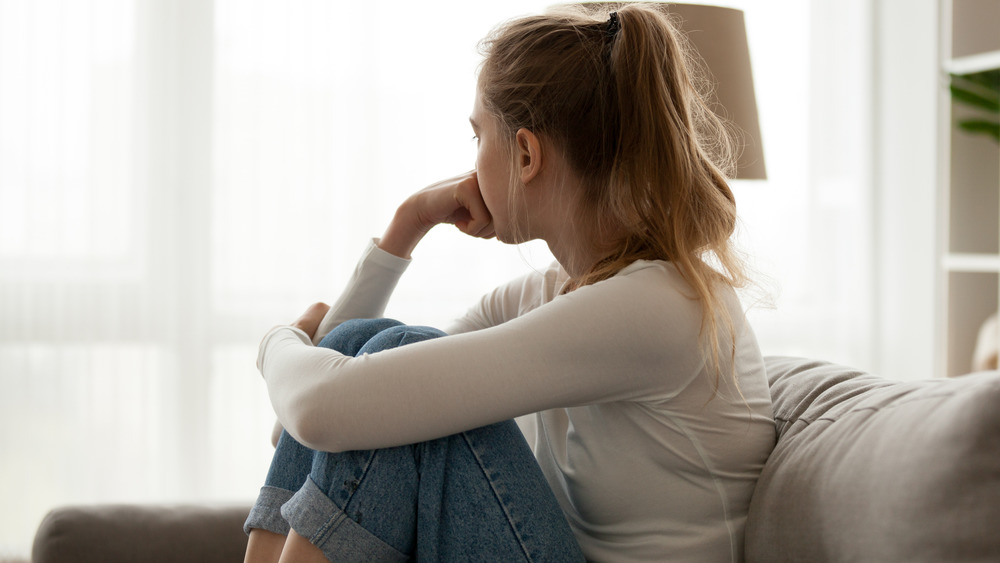Surprising Ways Your Partner Can Affect Your Health
Your partner can have obvious effects on your mental health. You may feel like you're on a high when the relationship is going well, or you may feel down in the dumps when conflicts inevitably arise or plans go awry. Yes, it's no secret that falling in love or getting your heart broken makes you feel a certain way. But did you know that in addition to your relationship causing changes in your brain that transform how you feel, your partner can actually have palpable effects on your physical health, too?
That's right. For better or worse, there's a lot of science proving the ways love can be a total doozy. You can experiences some change that you'd never guess would have anything to do with your partner. From boosting your immune system to causing you physical pain, here are some of the most surprising ways that your partner can affect your health.
Falling in love makes you feel high because it alters your brain
Ever wonder why you feel strange when you fall in love? Like you're high on life? It's because falling in love literally alters the chemical makeup of your brain; it gives you similar effects as some drugs. According to research published in The Journal of Sexual Medicine, your brain actually releases more of these chemicals like dopamine and oxytocin when you fall for someone. In fact, Harvard Health dubbed this phenomenon a "total eclipse of the brain."
Love can be broken down into three factors that each correlate to different hormones. For one thing, lust is driven by testosterone and estrogen, which both boost libido in men and women. Secondly, attraction is driven by dopamine (which makes us feel good), norepinephrine (which makes us feel giddy and euphoric), and serotonin (which makes us feel happy and optimistic). Lastly, attachment is driven by oxytocin, which is associated with trust and empathy. According to research published in the Indian Journal of Endocrinology and Metabolism, oxytocin is the hormone you release when you experience sexual pleasure, too.
You really can cuddle away your stresses
If sometimes all you want or need is a hug to make you feel better, you're not alone. Research published in Developmental Review found that you really can cuddle away your stresses. That's because physical touch has both physiological and biochemical effects that calm you down. When hugging your partner or cuddling up together on the couch, your heart rate slow and your blood pressure decreases. Your partner's touch also lowers your level of cortisol (the stress hormone) while boosting your levels of oxytocin and serotonin.
After all, why do you think massage therapy is so beneficial to so many people? It's not just because working out those knots in the muscles feels good. Touch therapy is used to heal people in a lot of ways: It reduces physical pain, helps many people alleviate symptoms of depression, and even improves the immune system, according to the Touch Research Institute at the University of Miami Miller School of Medicine.
The health of your relationship is connected to your longevity
Did you know that the healthier your relationship, the longer you're likely to live? That's right, folks. According to research published in PLOS Medicine, people who have social support from loved ones, like partners, are generally happier and have fewer health problems than people who don't have such support systems. As a result, they are able to go on living for longer.
In fact, the researchers even suggested that "the influence of social relationships on risk for mortality is comparable with well-established risk factors for mortality." In other words: Your relationship may play an equally important a role in your longevity compared to other, more traditional ways of staying healthy.
But don't let the science fool you. Having social relationships like a partner in your life likely won't just help you live longer simply by being there. These have to be positive relationships that provide value to your life and keep you happy, which a wealth of research has always said contributes to good health. If you're in a toxic relationship — one that is constantly causing stress in your life — it could actually lead to more health problems that could cut your life short.
The more optimistic your partner is, the healthier you'll be
It's certainly nice to have an optimistic partner around. For all the times, well, you know, life happens, it just feels better to have someone there who is always looking on the bright side and finding the silver lining. Who doesn't like having a happy-go-lucky person nearly always available to lift their spirits, right? But your partner's optimism doesn't just give you hope or help you to see the light at the end of the tunnel.
According to research published in the Journal of Psychosomatic Research, your partner's optimism also makes you healthier (via University of Michigan News). This is because they may encourage you to make better choices (like adopting a workout routine or healthy diet) that help your health because they genuinely believe in you and the importance of those choices.
"A growing body of research shows that the people in our social networks can have a profound influence on our health and well-being," Eric Kim, a doctoral student in the University of Michigan Department of Psychology and the study's lead author, said of his research. "This is the first study to show that someone's else optimism could be impacting your own health."
The more satisfying your marriage is, the more pounds you'll probably put on
Many of us know what it's like to get into a happy relationship and put on a few pounds. You're content, you've found someone who loves you just the way you are, and you probably spend a lot of time going out to eat or vegging out on the couch while binge-watching trash TV with that person. It's sort of inevitable that you'll pack on a bit of weight if you're not paying any mind to it.
Research published in the journal, Health Psychology, confirmed that marital satisfaction indeed predicts weight gain in your early years of marriage. In other words: The happier you are as newlyweds, the more likely it is that you'll put on some pounds in that honeymoon stage.
"These findings challenge the idea that quality relationships always benefit health, suggesting instead that spouses in satisfying relationships relax their efforts to maintain their weight because they are no longer motivated to attract a mate," the researchers wrote, encouraging people to think about their weight in terms of their health rather than solely their appearance.
If you and your partner want to lose weight, you'll lose more together
While you may put on some weight with your partner, chances are that you'll have an easier time losing it together (if you want to, anyway!). A report published by the European Society of Cardiology found that spouses shed more pounds together. In the study of people who joined weight-loss programs both with and without their partners, those who went into it alongside their partners lost more weight than those who went into it solo.
"Our study shows that when spouses join the effort to change habits, patients have a better chance of becoming healthier — particularly when it comes to losing weight," wrote the study's author, Lotte Verweij, a registered nurse and PhD student at the Amsterdam University of Applied Sciences.
Other research supports this, too. One study published by Johns Hopkins Bloomberg School of Public Health found that couples who work out together fare better. When your partner improves their fitness, their behaviors and routines are likely to encourage you to follow suit.
You'll probably get better, deeper sleep if you sleep beside your partner
Sure, sharing a bed isn't always so wonderful — especially if your partner hogs the blankets, tosses and turns often, or performs a snoring symphony every night. Regardless, research published in the journal Frontiers in Psychiatry found that sleeping alongside your partner is actually really good for you. In fact, you probably get better, deeper sleep together than you do alone. You may wake up feeling more rested and rejuvenated than you would if you hit the hay by yourself.
Additionally, other research published in the journal Behavioral Sleep Medicine suggested that improving your marriage will improve your quality of sleep (the less stress you have, the easier it is to fall and stay asleep). And the better sleep you get, the better off you and your relationship will be. Think about it: No more grumpy mornings or arguments purely because you're irritable from sleep deprivation. So spend your nights together for the sake of your marriage and your rest.
When you feel loved and cared for, you get sick less and recover faster
Did you know that when you feel loved and cared for by your partner, you'll actually get sick less? And that when you do get sick, you'll get better way faster than you would if you didn't feel so supported? Yes, according to research cited by the University of Texas at Austin, being in love and feeling loved reduces your chances of catching colds and other viral infections. If and when you do fall ill, though, you'll likely recover pretty quickly.
Why does this happen? Well, a study published in the journal Psychoneuroendocrinology found that falling in love is linked to the increased activity of genes that are involved in antiviral defense s— Type I interferon response genes— and a reciprocal down-regulation of α-defensin-related transcripts. In other, unscientific words: Your body literally produces less of the bad stuff and more of the good stuff, which fends off the bad stuff.
Your partner can make your heart happy and healthy
It probably doesn't come as much of a surprise that your partner has a serious impact on your heart. But we're not just talking about your mushy-gushy figurative heart here. There's serious science behind the ways that your partner can affect your physical heart health.
Your beloved does so by putting you at a lower risk of developing cardiovascular disease, according to research published in the Journal of Epidemiology and Community Health. The science found that as your relationship improves, your heart health improves too. Factors that contribute to cardiovascular disease, including your cholesterol and body mass index (BMI), lower. In contrast: If your relationship deteriorates, so will your heart health. Your cholesterol, BMI, and blood pressure will likely raise over time.
"Improvement and deterioration of longitudinal relationship quality appears associated with respectively positive and negative associations with a range of CVD [cardiovascular disease] risk factors," the researchers concluded.
Your marriage and mental health go hand in hand
Your marriage and your mental health go hand in hand: When one improves, so does the other. And when one starts to sink, so does the other. A burgeoning body of research suggests that people in happy marriages have better mental health, and more research says that people with better mental health have more satisfying marriages. Even more research, published in eharmony's Happiness Index: Love and Relationships in America, explained that by talking about your mental health in your marriage, you can boost your mental health and your marriage (via Bustle). In short: These factors all works together.
Couples counseling via traditional talk therapy is one way to tackle mental health issues that may affect your marriage. The more you both take care of your mental health, the more satisfied you'll be in your marriage, and the better you'll both feel because of it.
A close relationship with your partner may lessen your anxiety
It's normal to feel anxious. We're willing to bet that everyone has experienced anxiety at one point in time. In fact, anxiety disorders are the most common type of mental illness in the United States, affecting more than 40 million adults (or 18.1 percent of the population) every year, according to the Anxiety and Depression Association of America. If you're feeling pangs of anxiety, your partner may just be able to help you. If you're in a strong relationship, leaning on that relationship could help you turn your feelings around.
Citing several studies, Time revealed, "Being in love and feeling close to another person can mitigate anxiety." That said, rocky relationships can also be a source of anxiety for some people, according to research published in the Journal of Abnormal Psychology. The study found that some married women believe their partners play some role in "causing, aggravating, or ameliorating" anxiety for them.
Cohabitation with your partner alters your microbiome
Were you aware that when you decided to live with your partner that, you essentially signed up to alter your skin microbiome? It sounds hard to believe, but moving in with your partner changes a lot more than just your relationship status. It even changes the bacteria that lives on and in you, from your human tissues to your biofluids. While this sounds kind of gross, it's actually pretty cool.
In a study published by the American Society for Microbiology, cohabiting couples could be identified 86 percent of the time just purely based on their skin microbiome profiles. They tended to have "the most similar overall microbial skin communities on their feet," per the study. That makes sense, we suppose. You walk around the same place all day and night, after all. Other parts of your body will also be affected, of course. And factors like pets and skincare products play a role in your microbiology, too.
You'll physically feel your partner's pain
Have you ever heard the saying, "I feel your pain"? Or how about, "My heart hurts for you"? They're not just sayings. In fact, they are grounded in a lot of truth — especially for couples who deeply love each other. A study published in the journal Scientific Reports found that you really can feel your partner's pain. If your partner is feeling the effects of some physical or emotional trauma, you may truly empathize so much that you feel some pain, too, a study cited by BBC News revealed.
While you may feel some of the pain, it's important to note that this doesn't exactly help your partner. More research published in The Journal of Pain explained that the more empathy you feel for your partner, the more pain they'll feel, too. In the study, the researchers remarked that "perceived higher empathy from the partner led to significant increases in pain." Ouch.
You really can die of a broken heart
There's a country song titled "Die from a Broken Heart" by the talented duo, Maddie & Tae. The lyrics pose the question, "Mama, can you die from a broken heart?" And, we hate to be the ones to say it, but the answer is yes. You really can die from a broken heart. While it's not probable, it is indeed possible. According to the American Heart Association, broken heart syndrome is real.
According to Harvard Health, this syndrome is caused by a sudden rush of stress hormones like adrenaline and cortisol, which can occur after a traumatic, shocking, or extremely emotional event (like a breakup or the death of a partner). If it happens to you, you might feel like you're having a heart attack. Your heart rhythm will even show dramatic changes like it would with a heart attack, but there's no evidence that broken heart syndrome causes blocked heart arteries like heart attacks do, according to the American Heart Association. Instead, your heart may temporarily enlarge and struggle to pump, but doctors can usually treat your symptoms. However, in rare cases, broken heart syndrome can be fatal.















